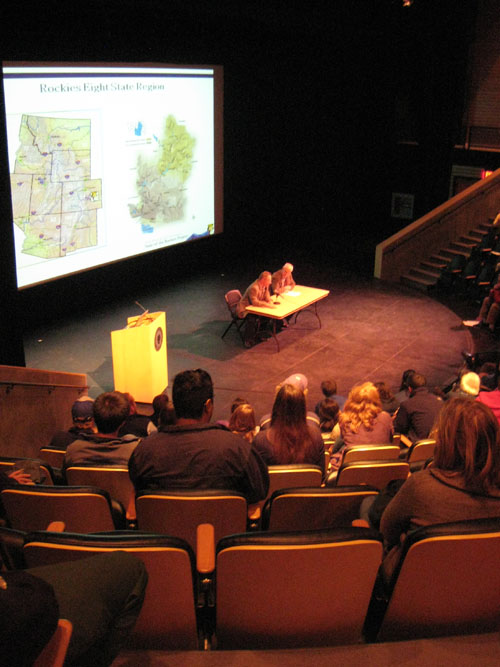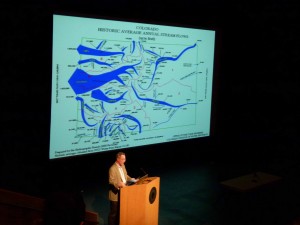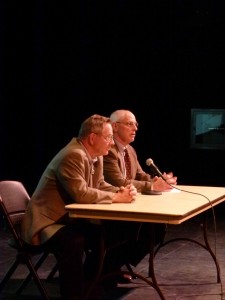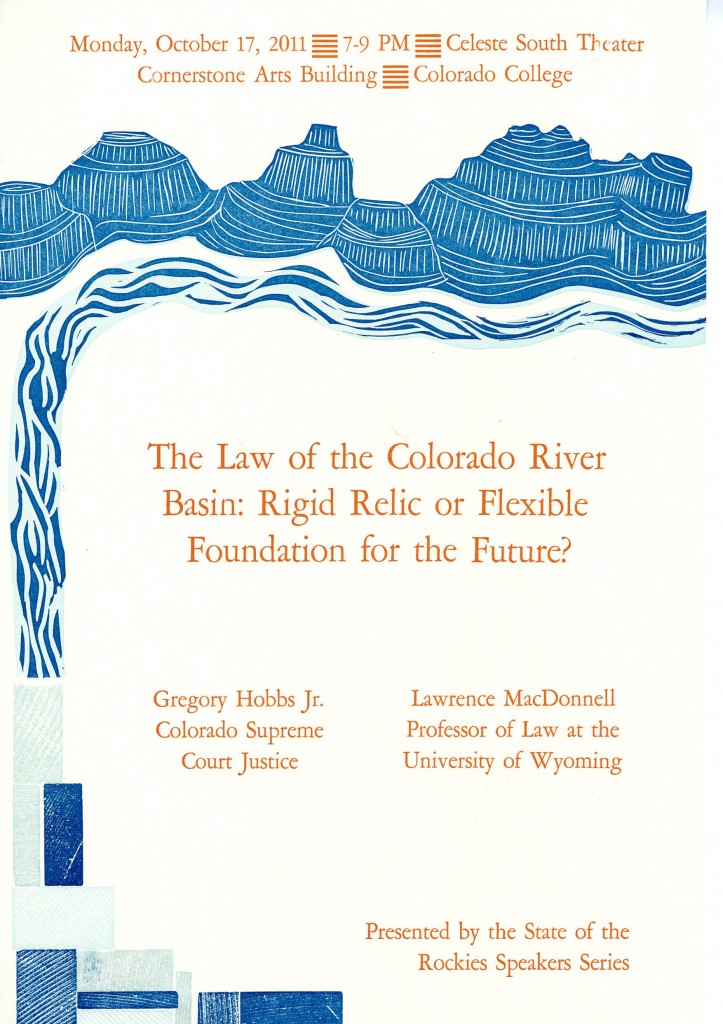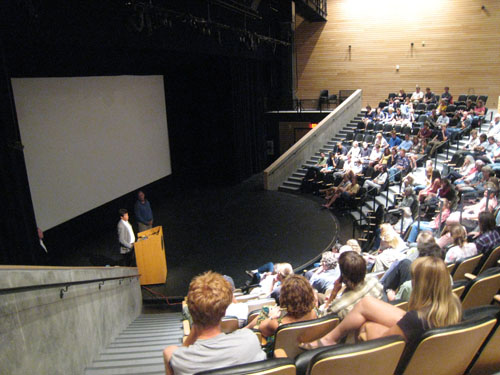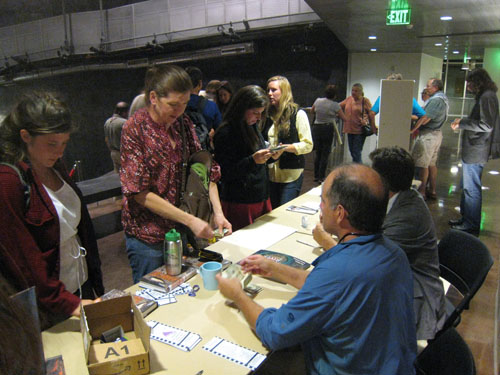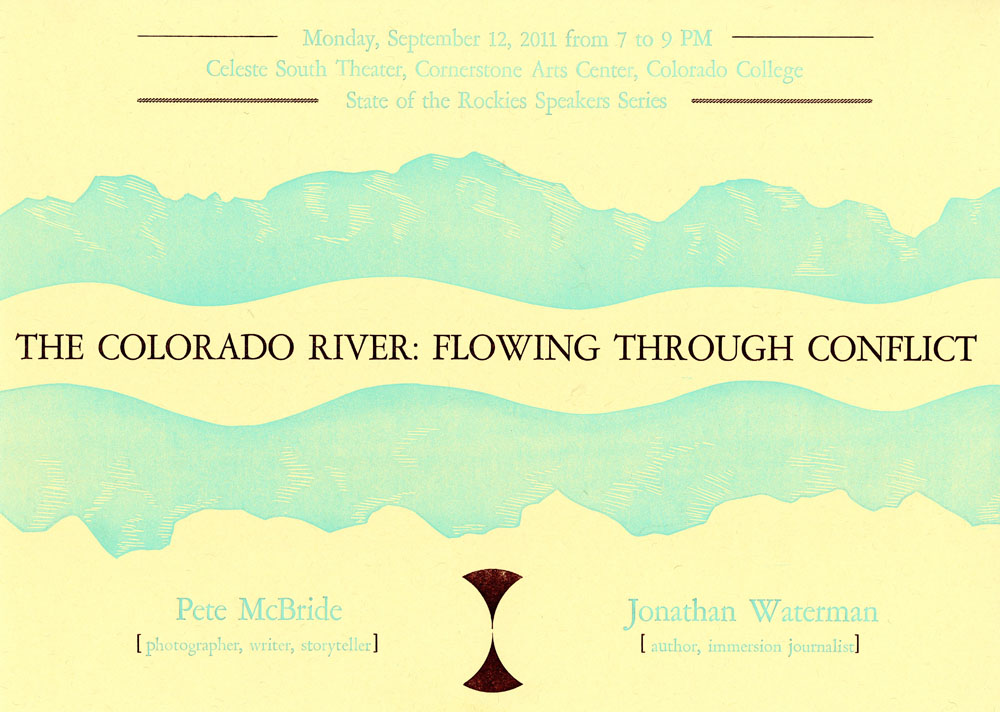Take a look at Chris Woodka’s article in the Pueblo Chieftain regarding last week’s Rockies Project Speakers Series event on the Law of the Colorado River Basin. The article speaks to the differing views of both men regarding the legal framework of the Basin: http://www.chieftain.com/news/local/colorado-river-law-time-for-change/article_f0e0e0a6-fdf3-11e0-85eb-001cc4c03286.html
Blog
State of the Rockies Project: Two environmental law experts discussed Monday at The Colorado College the laws controlling Colorado River water allocation
For millions of years, the Colorado River was an unbroken chain from the headwaters of Longs Peak in the Colorado Rockies to the Sea of Cortez delta in Mexico. But since 1998, overuse of the river’s water has left 90 miles of dry delta.
The Bureau of Reclamation maintains that Westerners are using every drop of the river, yet the demand for its water is expected to increase substantially over the next decades.
What can be done to balance the growing utilitarian need and preservation of the Colorado River?
The laws governing the river were addressed Monday, Oct. 17, during the second of The Colorado College’s State of the Rockies Project 2011-12 Monthly Speaker and Conference Series. The series examines the use, restoration and sustainability of the Colorado River Basin.
Greg Hobbs, a Colorado Supreme Court judge, and Lawrence MacDonnell, a law professor at the University of Wyoming College of Law, talked to about 300 students, faculty and El Paso County residents in Celeste South Theater on The Colorado College campus in Colorado Springs. The event was titled “The Colorado River Basin: Rigid Relic or Flexible Foundation for the Future?”
Hobbs and MacDonnell spoke of preserving river water through sensible use, and of solutions to the perfect storm of more demand for a finite resource.
The speakers said areas for conservation might occur in the unreasonably high allocation of water to California’s Imperial Valley, which gets one-fifth of the Colorado River water, and the high cost of delivering river water to metropolitan Arizona.
Solutions involved placing a limit on how much water new projects can allocate and decreasing use by the Lower Colorado River Basin.
“All these are easily doable by existing laws of the river and some new laws,” MacDonnell said, though he wondered if, politically, any of it was possible.
“My guess is we’ll wait to the crisis happens, when reservoirs are empty,” MacDonnell said. As humans, “we tend to put off unpleasant tasks” until the last minute.
Hobbs and MacDonnell also said that Westerners don’t value water because they don’t realize its actual cost. “If people paid anything close to what water actually costs,” MacDonnell said, “you would have different decisions being made.”
A short Q & A followed the speaker presentations.
A student wondered how you get companies, city governments and consumers to use less water when legally they are allowed their quota. Neither of the speakers had a good answer.
The next State of the Rockies speaker event is November 7 at the campus. It’s titled “The Colorado River Basin: Environmental Perspectives and Action.” Speaking at that event will be Bart Miller, a water program director at Western Resource Advocates; Jennifer Pitt, manager of the Environmental Defense Fund; and Tom Chart, an expert on fish biology. All series events are free and open to the public.
For more on upcoming State of the Rockies speaker events, go to http://www2.coloradocollege.edu/stateoftherockies/speakerseries.html.
Written by Mark Barna, State of the Rockies Project Writer
The Law of the Colorado River Basin- Rigid Relic or Flexible Foundation for the Future? Tonight (10/17) at 7pm!
The second State of the Rockies Speakers Series event of the year is tonight! Come join us at 7pm in the Celeste South Theater of the Cornerstone Arts Center on the CC campus to hear Colorado Supreme Court Justice Gregory Hobbs and U of WY Professor of Law Larry MacDonnell speak on The Law of the Colorado River Basin- Rigid Relic or Flexible Foundation for the Future?
The Colorado River Basin faces mounting challenges for the future, including the implications of climate change and the exploding demographic trends of the West. Roughly 27 million people rely on the river for water, energy, and healthy ecosystems. Studies predict that by 2050 the river system will be unable to meet the growing demand from the next generation. Can a nearly 90-year-old set of laws weather the turbulence of the 21st century? The Colorado River Basin is ruled by a compilation of decrees, rights, court decisions, and laws that together are referred to as the “Law of the River.” The keystone of these “commandments” is the 1922 Colorado River Compact, an interstate agreement created by the seven basin states with provisions for general water allotments. As municipalities, agriculture, and environmental interests jockey for continued water supplies in the face of projected diminished flows, will the Law of the River be able to bend under new stresses or will it break? For this talk, Colorado Supreme Court Justice Greg Hobbs and Colorado River legal scholar Professor Larry MacDonnell will discuss the implications of the river’s legal foundation for the next generation.
The next State of the Rockies Project Speakers Series event is less than a week away!
National Geographic adventure chroniclers talked Monday at The Colorado College about the environmental challenges the Colorado River faces
In 1998, the Colorado River ran dry for the first time on its journey to Mexico’s Sea of Cortez, leaving 90 miles of dusty, cracked delta. Over a spec of time in human history, humankind turned a boiling, dynamic 1,450-mile natural wonder into a smelly, listless cappuccino pit at its delta.
This issue was addressed Monday during the kick-off to The Colorado College’s State of the Rockies Project 2011-12 Monthly Speaker and Conference Series. The series examines the use, restoration and sustainability of the Colorado River Basin.
Pete McBride, a nature photographer, and Jonathan Waterman, a nature writer, spoke at the campus’s Celeste South Theater in Colorado Springs, Colo., to about 450 students and guests about the river’s challenges. They also showed McBride’s 20-minute film, “Chasing Water,” and answered questions from the audience.
McBride and Waterman are no strangers to the Colorado River.
In May 2010, Waterman published “Running Dry: A Journey from Source to Sea Down the Colorado River,” which describes his 100 days paddling, with extended breaks, the snaking river from headwaters to delta between May 2008 and January 2009. Six months later, “The Colorado River: Flowing Through Conflict” was published, a 160-page coffee table book of astounding river photographs by McBride and text by Waterman.
Waterman told the audience how 80 percent of the river water is siphoned away for agriculture. He said agricultural laws in the seven Western states the river flows through need to be revisited, and asked whether it’s sustainable to raise cotton and cattle in a burning desert-like climate where water is so scarce.
Waterman also said that oil-shale development is being proposed by oil giants that would use an enormous amount of Colorado River water. Oil-shale development requires 5 gallons of water for every 1 gallon of oil mined, Waterman said.
McBride and Waterman asked the audience to be more aware of where they get their water (85 percent of Colorado Springs water is from the Colorado River, McBride pointed out) and that the resource is finite.
“When you ask too much of a limited resource, it disappears,” McBride said.
Each month through January, Colorado College’s State of the Rockies Project is presenting a speakers event on various issues that influence the Colorado River Basin. The next event is Oct. 17 at the Celeste South Theater in the Cornerstone Arts Building on the Colorado College campus in Colorado Springs, Colo.
The event is called “The Law of the Colorado River Basin: Rigid Relic or Flexible Foundation for the Future?” Speakers are Gregory Hobbs Jr., of the Colorado Supreme Court, and Larry MacDonnell, a professor at the University of Wyoming College of Law.
The Colorado River Basin speaker series is free and open to the public. For more information of the series, go to http://www2.coloradocollege.edu/stateoftherockies/.
by Mark Barna, State of the Rockies Project writer
The first State of the Rockies Speakers Series event is tonight!
Come to the first State of the Rockies Speaker Series events tonight at 7pm in the Cornerstone Arts building on the CC campus! Jonathan Waterman and Pete McBride, co-authors of The Colorado River Basin: Flowing Through Conflict will be showing images from the recently published book and covering the issues of the Colorado River Basin. This first speakers series event will lay the foundation for the rest of the series titled: The Colorado River Basin: Agenda for Use, Restoration, and Sustainability for the Next Generation.
The State of the Rockies Project Speakers Series kicks off tomorrow night @ 7pm!
Join us tomorrow night, Monday 9/12, at 7 pm for the first State of the Rockies Project Speakers Series event of the year in the Celeste South Theater in the Cornerstone Arts building on the Colorado College campus. Jonathan Waterman and Pete McBride will be presenting on their recently co-authored book The Colorado River: Flowing Through Conflict and covering the contentious issues of the Colorado River Basin. This first event will lay the foundation for the rest of the Rockies Project Speakers Series: The Colorado River Basin- Agenda for Use, Restoration, and Sustainability for the Next Generation.
The first State of the Rockies Speaker Series event is just a few days away!
Come to the Celeste South Theater in the Cornerstone Arts building on Monday September 12th at 7pm to see Jonathan Waterman and Pete McBride kick off this year’s Sate of the Rockies Project Speakers Series. Jon and Pete will be covering issues of the Colorado River Basin and showing content from their recently co-authored book The Colorado River: Flowing Through Conflict. This first event will lay the foundation for the rest of the year’s Speaker Series titled The Colorado River Basin: Agenda for Use, Restoration, and Sustainability for the Next Generation.
Colorado College’s new President Jill Tiefenthaler blogs about the Rockies Project
Check out CC’s new President Jill Tiefenthaler’s blog and what she has to say to say about the State of the Rockies Project, this year’s Save the Colorado River Basin banner photo contest, and our field researcher Will Stauffer-Norris’ journey down the length of the Colorado River this fall: http://blog.coloradocollege.edu/president/
The first State of the Rockies Speakers Series event is quickly approaching!
The first State of the Rockies Speakers Series event is scheduled for 7pm September 12th, 2011. Jonathan Waterman and Peter McBride, co-authors of the recently published book The Colorado River: Flowing Through Conflict, will present their insights on the Colorado River along with some of the incredible images from their book. Check out Peter and Jon’s websites at: http://www.petemcbride.com/ and http://jonathanwaterman.com/. The talk will be held in the Celeste Theater in the the Cornerstone Arts Building on the Colorado College campus in Colorado Springs, CO at 7pm on 9/12/2011. Take a look at the rest of the speakers we’ve scheduled for the year here at: http://www2.coloradocollege.edu/StateoftheRockies/201112 Monthly Speakers/2011-12 Rockies talks and Conference announcement.pdf
